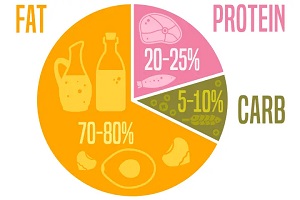
What is a Keto Diet and its Benefits?
Date: Friday 13th May 2022
The keto diet. Celebrities swear by it, it’s been used for centuries to treat specific medical conditions, and you may have been religiously lectured about it by some guy on a date. So, what is the keto diet and what is so great about it? Here’s a brief dive into the lifestyle.
What is a Keto Diet?
A keto diet (short for ketogenic diet) is a low-carb, high-fat eating plan similar to the Atkins diet. By significantly reducing the intake of carbohydrate and replacing it with fat, your body goes into a metabolic state called ketosis. During this state, your body efficiently uses fat for fuel instead of carbs.
What are the benefits?
Many people adapt the diet to reach their fitness goals, as it allows you to lose weight without counting calories. Studies have shown that the diet can have benefits on a wide range of health conditions too:
- Type 2 diabetes and prediabetes: studies have shown people that follow a keto diet has experienced improved blood sugar management and significant weight loss which is closely linked to type 2 diabetes. However, it may have an adverse effect for type 1 diabetes because of the increased ketone levels.
- Heart diseases: The diet can help to improve risk factors like body fat, HDL (good) cholesterol levels, blood pressure, and blood sugar.
- Cancers: Keto has been explored as an additional treatment for cancer, it may help slow tumour growth.
- Epilepsy: Keto can cause significant reductions in seizures in children.
- Alzheimer’s: Keto may help to reduce the symptoms and slow its progression.
Another positive side-effect in the long term is increased focus, energy, and brain function. When your body starts to burn more fat for fuel, your brain starts using ketones as an energy source which is much more powerful than glucose.
There are some minor negative side effects that have been reported such as bad breath, insomnia, and digestive issues. But they generally subside over time as people’s bodies adjust to the new diet.
|
How can I Adopt the Diet?
The standard ketogenic diet comprises of 70-80% fat, 20-25% protein and 5-10% carb. There are other types of keto diets that have a slightly varied composition such as cyclical, target or high protein keto diets. But these are mainly used by bodybuilders and athletes.
|
 |
Foods to have more of:
- Meat: red meat, steak, ham, sausages, chicken, turkey
- Fatty fish: Salmon, mackerel, trout, tuna
- Eggs, butter, and cream
- Unprocessed cheese: Cheddar, mozzarella, cream, blue, goat, parmesan etc.
- Nuts and seeds
- Healthy Oils: Extra virgin olive oil, coconut, avocado
- Low-carb vegetables: Greens, tomatoes, onions, peppers
Carb-based foods to avoid:
- Grains, sugars, legumes, rice, potatoes, candy, juice, alcohol, most fruits!
Usually, it takes about 2-4 days for your body to go into ketosis, but sometimes can take up to a week. To determine whether you’ve entered ketosis, there are tests available to measure the amount of ketones produced by your body.
There are many benefits to jumping on the keto train, but as always with adopting a new diet, make sure to consult with your doctor to see if it is suitable for you.

